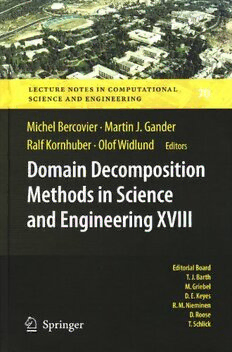Download Domain decomposition methods in science and engineering XVIII PDF Free - Full Version
Download Domain decomposition methods in science and engineering XVIII by Achi Brandt, Oleg Iliev, Joerg Willems (auth.), Michel Bercovier, Martin J. Gander, Ralf Kornhuber, Olof Widlund (eds.) in PDF format completely FREE. No registration required, no payment needed. Get instant access to this valuable resource on PDFdrive.to!
About Domain decomposition methods in science and engineering XVIII
th This volume contains a selection of 41 refereed papers presented at the 18 International Conference of Domain Decomposition Methods hosted by the School of ComputerScience and Engineering(CSE) of the Hebrew Universityof Jerusalem, Israel, January 12–17, 2008. 1 Background of the Conference Series The International Conference on Domain Decomposition Methods has been held in twelve countries throughout Asia, Europe, the Middle East, and North America, beginning in Paris in 1987. Originally held annually, it is now spaced at roughly 18-month intervals. A complete list of past meetings appears below. The principal technical content of the conference has always been mathematical, but the principal motivation has been to make ef cient use of distributed memory computers for complex applications arising in science and engineering. The leading 15 such computers, at the “petascale” characterized by 10 oating point operations per second of processing power and as many Bytes of application-addressablem- ory, now marshal more than 200,000 independentprocessor cores, and systems with many millions of cores are expected soon. There is essentially no alternative to - main decomposition as a stratagem for parallelization at such scales. Contributions from mathematicians, computerscientists, engineers,and scientists are together n- essary in addressing the challenge of scale, and all are important to this conference.
Detailed Information
| Author: | Achi Brandt, Oleg Iliev, Joerg Willems (auth.), Michel Bercovier, Martin J. Gander, Ralf Kornhuber, Olof Widlund (eds.) |
|---|---|
| Publication Year: | 2009 |
| ISBN: | 9783642026775 |
| Pages: | 392 |
| Language: | English |
| File Size: | 8.552 |
| Format: | |
| Price: | FREE |
Safe & Secure Download - No registration required
Why Choose PDFdrive for Your Free Domain decomposition methods in science and engineering XVIII Download?
- 100% Free: No hidden fees or subscriptions required for one book every day.
- No Registration: Immediate access is available without creating accounts for one book every day.
- Safe and Secure: Clean downloads without malware or viruses
- Multiple Formats: PDF, MOBI, Mpub,... optimized for all devices
- Educational Resource: Supporting knowledge sharing and learning
Frequently Asked Questions
Is it really free to download Domain decomposition methods in science and engineering XVIII PDF?
Yes, on https://PDFdrive.to you can download Domain decomposition methods in science and engineering XVIII by Achi Brandt, Oleg Iliev, Joerg Willems (auth.), Michel Bercovier, Martin J. Gander, Ralf Kornhuber, Olof Widlund (eds.) completely free. We don't require any payment, subscription, or registration to access this PDF file. For 3 books every day.
How can I read Domain decomposition methods in science and engineering XVIII on my mobile device?
After downloading Domain decomposition methods in science and engineering XVIII PDF, you can open it with any PDF reader app on your phone or tablet. We recommend using Adobe Acrobat Reader, Apple Books, or Google Play Books for the best reading experience.
Is this the full version of Domain decomposition methods in science and engineering XVIII?
Yes, this is the complete PDF version of Domain decomposition methods in science and engineering XVIII by Achi Brandt, Oleg Iliev, Joerg Willems (auth.), Michel Bercovier, Martin J. Gander, Ralf Kornhuber, Olof Widlund (eds.). You will be able to read the entire content as in the printed version without missing any pages.
Is it legal to download Domain decomposition methods in science and engineering XVIII PDF for free?
https://PDFdrive.to provides links to free educational resources available online. We do not store any files on our servers. Please be aware of copyright laws in your country before downloading.
The materials shared are intended for research, educational, and personal use in accordance with fair use principles.

